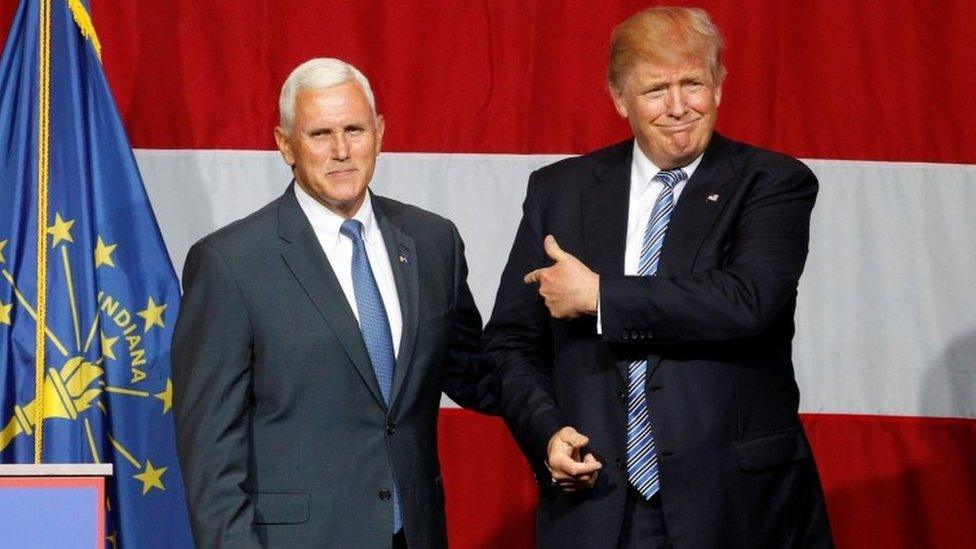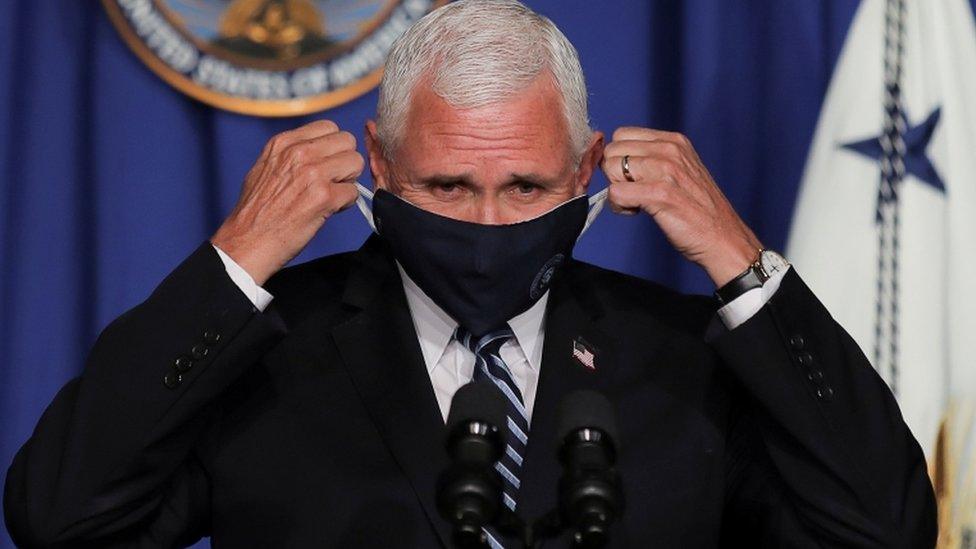Mike Pence: From Indiana to the White House
- Published
Why did Trump pick Pence for VP?
Mike Pence has taken centre stage in the presidential race as he debated the Democratic running mate. Who is the US vice-president?
Over the last four years, Mr Pence has been a very adept deputy, not least in leading the team deciding key appointments in the administration, and being a smooth communicator in media appearances.
For the most part, the vice-president has avoided generating too many headlines, though most recently he has been more in the spotlight in his role leading the White House coronavirus task force.
In a less conspicuous role, Mr Pence was also put in charge of US space policy with the renewed National Space Council.
Mr Pence's journey to the White House began in July 2016, when US President Donald Trump visited the then 57-year-old at his Indianapolis home and asked him to join the ticket.
It's easy to see why he was asked. The former governor was a favourite among social conservatives who boasted considerable experience in Washington.
Before being named as the vice-presidential pick, Mr Pence openly criticised some of Mr Trump's policies.
He called Mr Trump's proposed ban on Muslims entering the US "offensive and unconstitutional" and called the one-time business mogul's comments on US District Judge Gonzalo Curiel "inappropriate".
Mr Trump had suggested a judge's Mexican heritage prevented him getting a fair trial in a suit against Trump University.
Mr Pence is now seen as a loyal second-in-command who rarely voices criticism of the president.
US vice-presidential debate: Two styles of attack
There have been some bumps in the road over the past four years.
The first negative headlines for Mr Pence were in 2017, concerning his use of a private email account while Indiana governor.
After being a fierce critic of Hillary Clinton for her unusual email arrangements, he was accused of hypocrisy, although unlike her, he was not handling classified information on his AOL account.


He also courted controversy this May by declaring he would be happy to see Michael Flynn - the former national security adviser snared by the special counsel inquiry into Russian meddling in the 2016 election - welcomed back to the administration.
And he has been criticised for comments he has made on the coronavirus in the US, including that the panic over the pandemic was "overblown".
Liberal roots
Mr Pence was raised Catholic along with his five siblings in Columbus, Indiana.
He told the Indianapolis Star in 2012 that liberal icons John F Kennedy and Martin Luther King Jr inspired him to begin a career in politics.
Mr Pence, who has described himself as "a Christian, a conservative and a Republican, in that order", voted for Jimmy Carter, a Democrat, in 1980.
He has said it was not until college when he met his future wife, Karen, at an evangelical church that his views began to shift.

The governor also spent 12 years in Congress
A former radio show host, Mr Pence served as governor of Indiana from 2013-17, but also has 12 years of legislative experience as a member of the US House of Representatives.
During his final two years in Washington, he served as the chair of the House Republican Conference, the third highest-ranking Republican leadership position.
He also chaired the Republican Study Group, a coalition of conservative House Republicans, which was seen as giving him a potential boost with some evangelicals of the party that have questioned Mr Trump's ideological purity.
Mr Pence had previously considered a run for the White House. In 2009, he visited early primary states, fuelling speculation that he had ambitions for a 2012 run.
During the 2016 campaign, Mr Pence kept a busy schedule alongside Mr Trump as he appeared in rallies nationwide - often in a number of states per day.
One of his key roles was supporting the candidate when controversies erupted: he defended Mr Trump when he appeared to suggest people take arms against then presidential rival Hillary Clinton, and stood up for Mr Trump's son, Donald Trump Jr, over comments he made comparing refugees to Skittles.

Vice President Mike Pence led the White House coronavirus task force
He did go against Mr Trump's long-held view that former president Barack Obama was not born in the United States (days later, Mr Trump said he too had changed his mind on this issue).
Courting controversy
When governor, he sparked a public outcry after signing the Religious Freedom Restoration Act into law.
Critics argued the law discriminates against the LGBT community by allowing businesses to refuse service over religious beliefs.
Under national pressure, he later signed an amendment stating businesses could not discriminate against gay people, drawing criticism from conservatives who said they felt betrayed by the revision.
He is known for his staunch opposition to abortion.
Mr Pence, an evangelical Christian and father of three, also signed into law one of the strictest abortion laws in the country as governor.
Indiana implemented a ban on abortions based solely on the foetus's sex, race, or disability diagnosis, which was later struck down by an appeals court.
In 2017, Mr Pence became the first sitting vice-president to attend America's largest annual anti-abortion rally, March for Life, and has since attended the event regularly.
In 2012, the then-congressman likened the Supreme Court's ruling upholding the Affordable Health Care Act to the 9/11 terrorist attacks in a closed-door House Republican meeting.
He later apologised.
